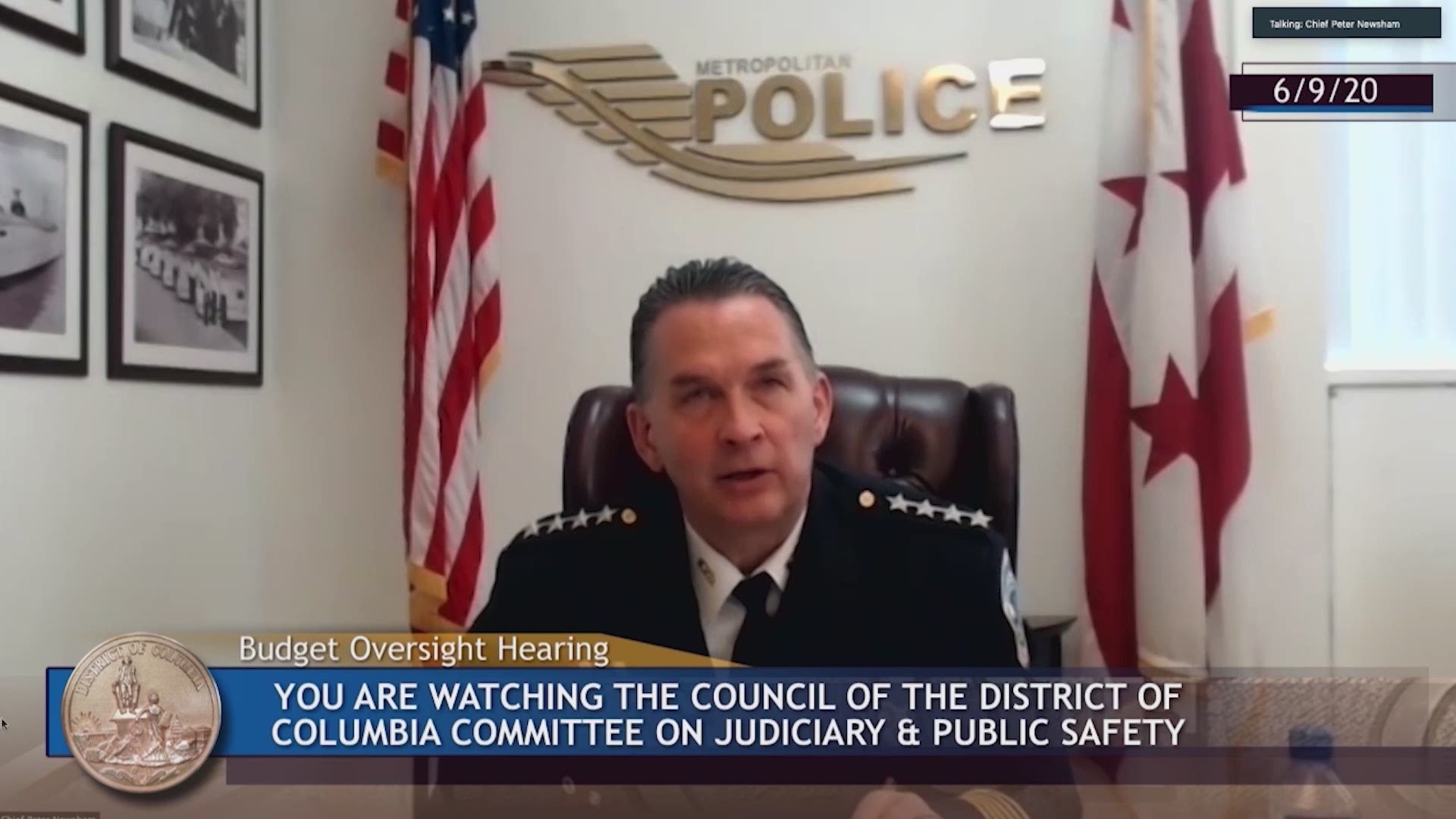WASHINGTON — In September, on the heels of the release of comprehensive stop and frisk data showing Black people are far more likely to be stopped by MPD than their white peers, DC Police pledged to hire outside researchers to analyze and interpret the data to find out why.
But now, 10 months later, a WUSA9 investigation has uncovered delays and indecision have stalled the city’s analysis of those numbers.
DC Police Chief Peter Newsham was most recently asked about the project in June, when the DC Council probed him on it and new numbers reported by WUSA9 during the department's annual budget hearing.
Between July 22 and December 31 of last year, WUSA9's analysis found Black people were six times more likely to be searched and seven times more likely to be frisked during stops.
That’s despite the fact that D.C. has roughly the same percentage of Black and white residents, according to the most recent Census numbers.
Councilwoman Brianne Nadeau asked Newsham what MPD planned to do about those concerning statistics.
“So, I think that one of the things we're doing is we've been reaching out to research groups to try and figure out what our stops should look like,” Newsham said. “Because you know, you get hit with that number of a disproportion of stops and everybody's like, oh my God, we got to do something to fix this. And if we do have to fix it, then we got to fix it.”
Studying that stop and frisk data is a promise MPD and DC Government have been making since September 2019, when the department released its first police stop data report required by the NEAR Act.
WUSA9’s ongoing series of reporting on stop and frisk has showed DC Police delayed collecting that data for more than two years. And it now appears District leaders are running behind again when it comes to the pledge to dig into the data to find out why Black people are stopped and frisked more often than whites.
And most importantly: what needs to be done to stop it from happening.
SPECIAL SECTION | D.C. Stop and Frisk
In an interview with WUSA9 in September 2019 – just 10 months ago – D.C. Deputy Mayor for Public Safety and Justice Kevin Donahue said the District was ready to move forward with its study.
“The first thing that we are going to do, recognizing this is a difficult challenge, is we are going to bring in an outside party, an outside firm, to study it independently,” Donahue said. “To give them access to body camera footage, give them access to all the data we have, and make recommendations about what does fair look like.”
At the time, Donahue told WUSA9 the bids for that research project would go out in the fall of 2019.
MPD even wrote it into the “next steps” portion of its September 2019 “Stop Data Report,” saying it was pursuing "both public and private options to support this sort of rigorous and independent research.”
At the time, MPD said the department would be working with a team of scientists in Mayor Muriel Bowser’s administration, known as The Lab @ DC to “ensure that any independent researchers engaged do this in a transparent and scientifically valid manner, such as by sharing a pre-analysis plan to be reviewed by experts in the field.”
So, who are those experts? WUSA9 asked the top criminal justice programs in the country. They said if a law enforcement agency was going to conduct a study on police data, there is a short list of experts you would turn to, including:
- The National Police Foundation
- The Police Executive Research Foundation
- The Center for Evidence Based Crime Policy
- Center for Policing Equity
- SPARQ at Stanford
- Professor Anthony Braga at Northeastern University
- Professor Jerry Ratcliffe at Temple University
- Professors Andy Gelman and Jeff Fagan at Columbia University
- Professor Scott Wolfe at Michigan State University
- Professor Don Brayman at George Washington University Law School
- Professor Mike Smith at the University of Texas at San Antonio
- Professor Justin Nix at University of Nebraska – Omaha.
- Professor Geoff Alpert at the University of South Carolina
WUSA9 contacted everyone on the list, but none of the researchers who responded to our inquiries said they had heard from the D.C. Metropolitan Police Department about its stop data project.
So, if not them, just who has MPD hired to analyze its police stop data? And when will D.C. residents see the results?
WUSA9 has now discovered the work may not have even started yet. In fact, when Councilwoman Nadeau asked Newsham about it at MPD’s budget hearing in June, Newsham appeared to be caught off guard by the question. When pressed, he asked his staff, who said it had been delayed by the coronavirus pandemic – although the first case of the virus wasn't reported in the D.C. metro until early March, six months after a review was promised.
"But I tell you, from my perspective, I consider it a priority," Newsham said.
According to MPD’s most recent Stop Data Report, released in February, the department now says it’s going to rely on a partnership between the scientists at The Lab @ DC and the Innovative Policing Program at Georgetown Law to bring together a team of independent experts to figure out the fairest way to analyze MPD’s stop data.
But when WUSA9 contacted Georgetown Law, a spokesperson says even that hasn’t started yet.
While D.C. waits to start this project, WUSA9 has learned at least one department in our area has been able to move forward with police data research amid the coronavirus pandemic.
The Fairfax County Police Department is currently working with experts at the University of Texas-San Antonio to analyze the role of race in use of force incidents. Work on that project has been ongoing since February.

